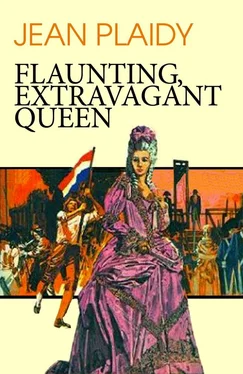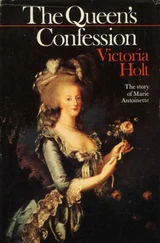Виктория Холт - Flaunting, Extravagant Queen
Здесь есть возможность читать онлайн «Виктория Холт - Flaunting, Extravagant Queen» весь текст электронной книги совершенно бесплатно (целиком полную версию без сокращений). В некоторых случаях можно слушать аудио, скачать через торрент в формате fb2 и присутствует краткое содержание. Жанр: Исторические любовные романы, на английском языке. Описание произведения, (предисловие) а так же отзывы посетителей доступны на портале библиотеки ЛибКат.
- Название:Flaunting, Extravagant Queen
- Автор:
- Жанр:
- Год:неизвестен
- ISBN:нет данных
- Рейтинг книги:5 / 5. Голосов: 1
-
Избранное:Добавить в избранное
- Отзывы:
-
Ваша оценка:
- 100
- 1
- 2
- 3
- 4
- 5
Flaunting, Extravagant Queen: краткое содержание, описание и аннотация
Предлагаем к чтению аннотацию, описание, краткое содержание или предисловие (зависит от того, что написал сам автор книги «Flaunting, Extravagant Queen»). Если вы не нашли необходимую информацию о книге — напишите в комментариях, мы постараемся отыскать её.
Flaunting, Extravagant Queen — читать онлайн бесплатно полную книгу (весь текст) целиком
Ниже представлен текст книги, разбитый по страницам. Система сохранения места последней прочитанной страницы, позволяет с удобством читать онлайн бесплатно книгу «Flaunting, Extravagant Queen», без необходимости каждый раз заново искать на чём Вы остановились. Поставьте закладку, и сможете в любой момент перейти на страницу, на которой закончили чтение.
Интервал:
Закладка:
Maria Theresa was in financial difficulties, but she was determined that her little daughter should go to her new country richly apparelled and with a dignified escort. The Court dressmakers were busy and young Antoinette was forced to stand impatiently while fine linen, silks, velvets and the finest lace were fitted to her slender form. She tried on precious jewels. This was quite enjoyable; she delighted in the glittering stones, and most of all she admired diamonds.
The beautiful garments, the sparkling gems, the excitement of preparation, made her forget the sorrow of parting, of which they were really the heralds.
I won’t think of it, she would tell herself. Perhaps Mother will come with me after all. Why should she not? We could leave Joseph behind in Vienna.
Thinking thus she could enjoy her preparations, for she realised that if her mother were with her she would have nothing to fear from the French.
Louis, now that he had signified his agreement to the marriage, was determined to show the world that very little had changed in France since the days of le Roi Soleil. He was going to dazzle these Austrians with his magnificence. He gave orders that the Embassy in Vienna should be almost rebuilt, for in its present state it was by no means worthy to house all the guests who would attend the marriage by proxy of his grandson.
While the French Embassy was being rebuilt Maria Theresa was spending a great deal of time with her daughter; she was alternately affectionate and scolding; but the scolding was not without its tenderness. Maria Theresa was not a sentimental woman, but how could she help being utterly charmed by her youngest child? Antoinette was so eager to please that even her wilfulness was charming. It was not that she deliberately refused to concentrate on her lessons but that it was so difficult for her to do so. There were after all so many exciting things to do. There was one tutor with whom she did work hard; he was Noverre, the dancing master.
Noverre was very pleased with his pupil. ‘The Archduchess is the best pupil I ever had,’ he declared. ‘She is so light on her feet, so dainty in her movements, so quick to learn the new steps. Her dancing will excite the admiration of all France.’
But then of course she enjoyed dancing. She would cry when the lesson was over: ‘No, no! I want to try that again.’ And flushed and so pretty, looking like an exquisite doll, she would twirl on her toes, or hold herself with stately majesty, as the dance demanded, and Noverre would applaud and compliment her and declare that the perfection of her movements brought tears to his eyes.
It was quite another matter when a language must be learned, when literature was discussed, or when it was necessary to grapple with mathematics.
Abbé de Vermond, whom Louis had sent to Vienna to be her tutor when he had heard that her mother had appointed two French actors to teach her French, despaired of making great headway with her.
It was not, he wrote to his master, that she was by any means stupid – far from it. Her mind was lively, but it was an impatient mind; it would not allow itself the careful study which was necessary if certain subjects were to be mastered. The Archduchess was somewhat frivolous, and quite lazy where something she was not interested in was concerned. She was far from lazy when it was a matter of dancing or running about the house and garden playing with her friends or the servants. His Majesty must not think that his granddaughter-to-be was not a delightful creature. Indeed it was this very charm of hers which had caused her to be a little spoilt. Not that the spoiling had harmed her character more than to make her lazy-minded and incapable of concentration. She was sweet-natured, generous, graceful of figure and beautiful of face. Indeed, were she a little taller (and it was possible that she yet had time to grow) and were she studious, she would present such an excess of virtue that she would frighten all from her presence.
It was quite clear that, although the Abbé de Vermond despaired of making his charge a scholar, he was completely enchanted with her.
Louis wrote that he was very desirous of greeting his grandson’s wife and that he was having an opera house built at Versailles so that the celebrations might take place there. He was having two carriages specially made by the royal coach-maker in Paris, and these should be sent to Austria to convey his grandson’s bride to her new home; and the Empress might expect any day the arrival of his envoy, Durfort, whom he was sending to Vienna to escort the bride to France.
Now Antoinette must think about her departure. Durfort had arrived. He had ridden to Vienna with forty-eight six-in-hands, in the centre of which procession were the two magnificent carriages which had been specially built in Paris for the use of the future Dauphine.
The Viennese had rarely seen such magnificence, for the coaches were lined with satin inside, while the outsides were painted in brilliant colours, decorated with paintings of golden crowns and covered with a coat of glass. Never before had such beautifully made carriages been seen in the streets of Vienna; and there was great rejoicing in the city and throughout all Austria on account of the French marriage which was calculated to bring such glory and long years of peace to the country.
Maria Theresa took her daughter to her apartments and talked to her long and seriously.
‘My darling,’ she began, ‘it will not be long now before you leave your home.’
Antoinette, seeing herself suddenly face to face with all that this parting would mean, threw herself into her mother’s arms. ‘Mother, need I go?’ she asked childishly.
‘Need you go! Now that is folly, is it not? How could you not go when the King of France has sent his envoy here to take you back with him, when he has had those two magnificent coaches built especially for you, when in a few days’ time your marriage by proxy will take place? No, do not let us waste the precious time left to us in foolish talk. My child, you are so young. Fourteen is not very old, but you will soon be fifteen and heirs to great crowns must not linger in their childhood. Sometimes I blame myself. I have been too indulgent towards you.’
‘Mother, you have been the dearest mother in the world. Whatever happens to me I shall remember that. It is better to have such a memory than all the learning in the world.’
‘Perhaps you are right, my child. But you have been inattentive with your tutors, and your French is not good. Your handwriting is unformed and excessively untidy, for you have done far from well at your lessons. But do not look so downcast. It may be that you have other qualities.’
‘What qualities?’ asked Antoinette eagerly.
‘You are gay, and the French like gaiety. You are pleasant to the eye and they like that too. When you dance you can look very graceful and very stately. We must make do with what you have learned, but dearest, apply yourself more. Do not be so impatient when there are lessons to learn. Never forget that you are the Archduchess of Austria and Dauphine of France. My darling, it may not be long before you are Queen of France. You must make the Court both love and respect you, and that is not always an easy thing to do.’
‘I will do it, Mother,’ said the girl with confidence.
‘I believe you will. But do not be careless of the feelings of those about you. Carelessness makes many enemies. You must make sure that you never offend the King and your new relations.’
‘Most of all my husband,’ said Antoinette with an air of wisdom.
‘I think you will find him forbearing and tolerant. He is young and he will love you, but his grandfather is the King and he may have friends to whom he wishes you to show respect. You must do this, but in such a way that it will bring no disrespect to yourself. You will understand what I mean. You must study their customs and make them your own. When you make your formal renunciation of your Austrian rights before the crucifix, you become a Frenchwoman, and you must never offend French etiquette. Always remember that I shall be here to help you. We may not meet, but there will be letters passing between us. If there is any matter however small which worries you, you must write to me of it. And you must take my advice.’
Читать дальшеИнтервал:
Закладка:
Похожие книги на «Flaunting, Extravagant Queen»
Представляем Вашему вниманию похожие книги на «Flaunting, Extravagant Queen» списком для выбора. Мы отобрали схожую по названию и смыслу литературу в надежде предоставить читателям больше вариантов отыскать новые, интересные, ещё непрочитанные произведения.
Обсуждение, отзывы о книге «Flaunting, Extravagant Queen» и просто собственные мнения читателей. Оставьте ваши комментарии, напишите, что Вы думаете о произведении, его смысле или главных героях. Укажите что конкретно понравилось, а что нет, и почему Вы так считаете.











